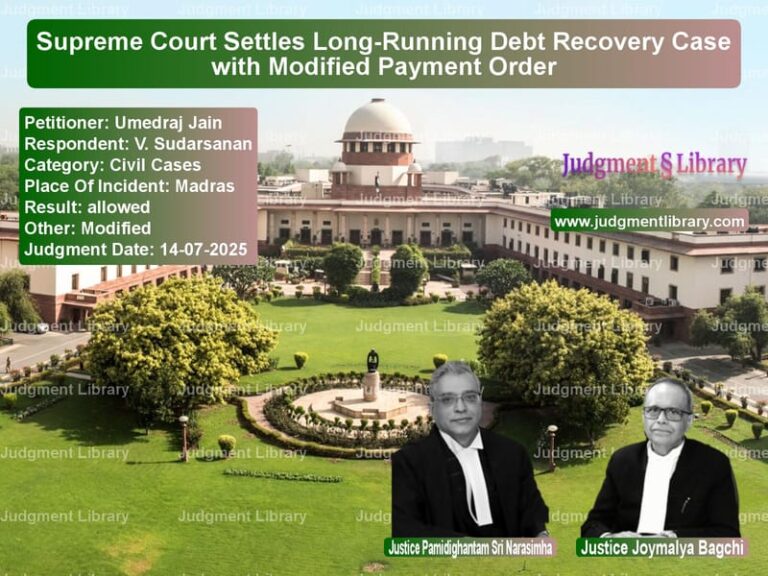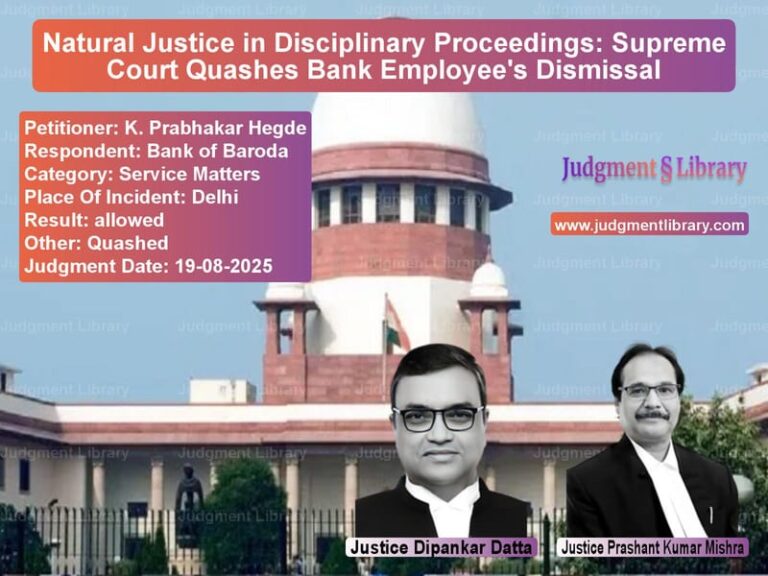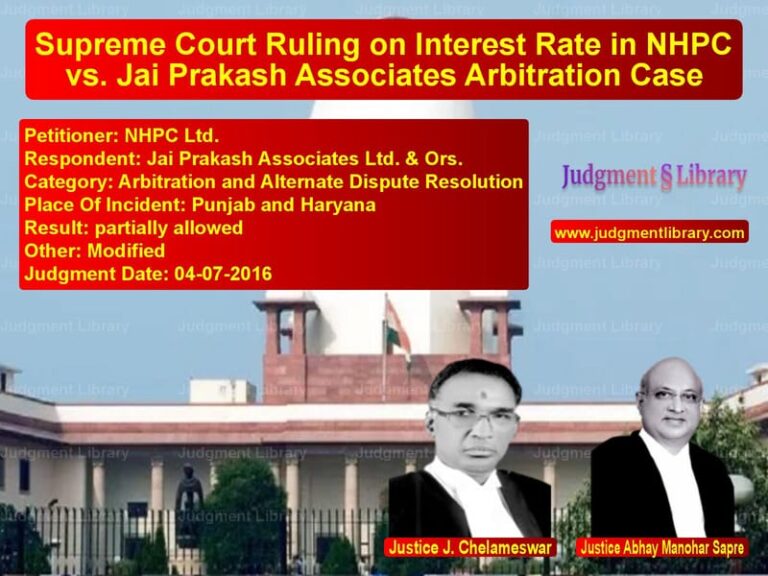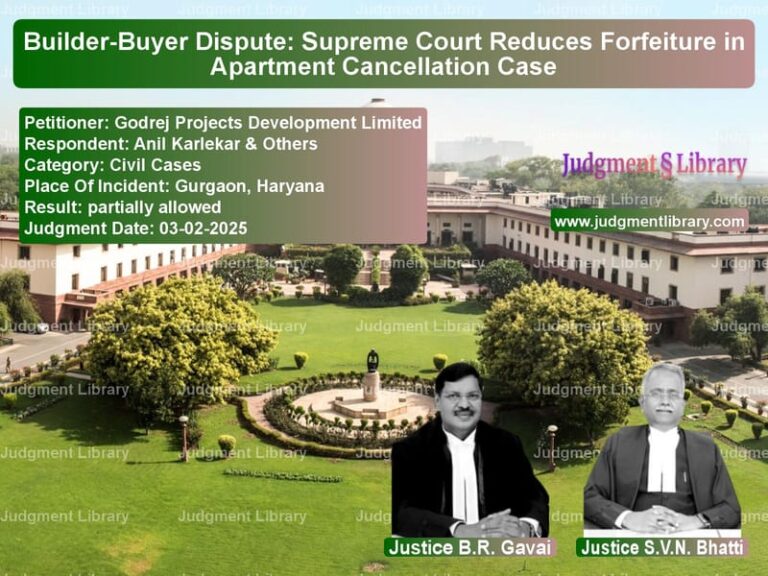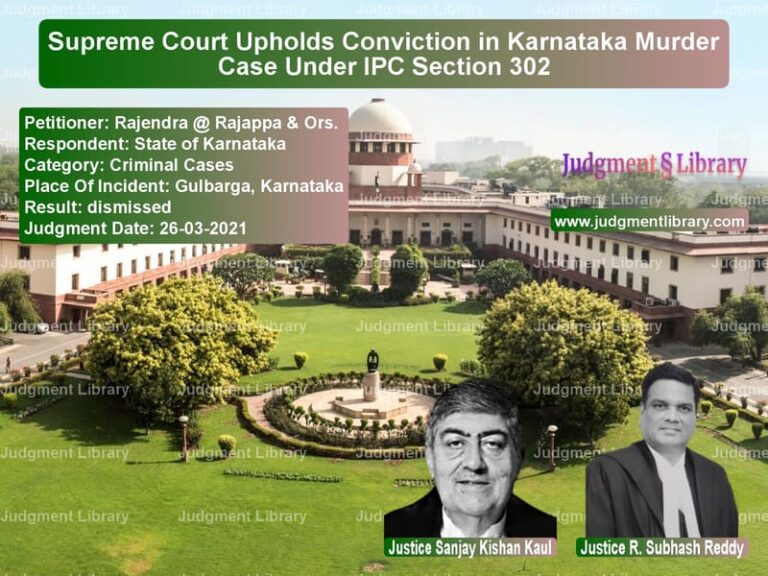Land Dispute in Manipur: Supreme Court’s Verdict on Delay in Filing Appeal
The case of The State of Manipur & Others vs. Koting Lamkang involved a dispute over government land possession and the procedural delay in filing an appeal by the State. The Supreme Court had to decide whether the delay of 312 days in filing a Regular First Appeal (RFA) by the State of Manipur should be condoned, considering the impact on strategic land interests.
Background of the Case
The dispute arose from a decree passed on July 18, 2016, by the Civil Judge (Senior Division), Chandel, Manipur. The decree required the appellants (the State of Manipur, the Director General of Police, and the Commandant of the 8th Battalion of the Manipur Rifles) to vacate and hand over possession of certain disputed land to the respondent, Koting Lamkang.
The appellants initially filed their appeal in the wrong forum—the District Judge, Imphal West—on June 15, 2017. However, the court ruled that it lacked jurisdiction over the matter. On July 28, 2017, the appellants were directed to file their appeal before the appropriate forum, the High Court of Manipur. The delay in filing the RFA before the correct forum led to its rejection by the High Court.
Petitioners’ Arguments
The appellants, the State of Manipur, contended:
- The delay was due to a bona fide mistake in filing the appeal in the wrong forum.
- The land in question was of strategic importance to the state, making it imperative for the appeal to be heard.
- Government decision-making involves bureaucratic delays, and this should be considered when applying the “sufficient cause” test for condoning the delay.
- If the appeal was not heard on its merits, the state would suffer irreversible harm by losing control over crucial land.
Respondent’s Arguments
The respondent, Koting Lamkang, argued:
- The appellants had no valid excuse for the long delay beyond the 44 days they spent in the wrong court.
- The decree had already been executed on July 11, 2018, and possession was transferred, making the appeal futile.
- The principles of finality in litigation should be upheld, and condoning the delay would undermine the respondent’s rights.
Supreme Court’s Observations
The Supreme Court acknowledged the procedural lapses but emphasized the need for a fair hearing, particularly when strategic government land was at stake. The Court noted:
“Regard should be had in similar such circumstances to the impersonal nature of the Government’s functioning where individual officers may fail to act responsibly. This, in turn, would result in injustice to the institutional interest of the State.”
Further, the Court observed:
- The state’s failure to explain the entire period of delay was problematic, but dismissing the appeal without hearing the case would result in public interest harm.
- While law of limitation must be applied strictly, courts should also consider public interest and national security concerns in government litigation.
- If the state’s appeal was not heard, it would lose possession of land that was allegedly still under its control.
Final Verdict
The Supreme Court ruled in favor of condoning the delay, stating:
- The Regular First Appeal should be restored and heard on merits by the High Court of Manipur.
- The state’s procedural mistakes should not outweigh the strategic importance of the land.
- The execution proceedings transferring land possession to the respondent were made subject to the final outcome of the High Court’s decision.
- The appellants were directed to pay Rs. 50,000 as costs for the delay.
Legal and Policy Implications
This ruling has significant implications for land disputes involving the government:
- Government appeals should not be dismissed solely due to procedural delays when public interest is at stake.
- Bureaucratic delays in state litigation should be considered while applying limitation laws.
- Strategic land disputes should be reviewed carefully before execution of possession orders.
Conclusion
The Supreme Court’s decision balances procedural fairness with the larger public interest. By allowing the State of Manipur’s appeal to be heard on merits, the Court ensures that important land disputes involving state institutions are resolved with due consideration. The ruling serves as a precedent for cases where governmental land acquisitions are contested, reinforcing that procedural lapses should not override substantive justice.
Petitioner Name: The State of Manipur & Others.Respondent Name: Koting Lamkang.Judgment By: Justice R. Banumathi, Justice A.S. Bopanna, Justice Hrishikesh Roy.Place Of Incident: Manipur, India.Judgment Date: 22-10-2019.
Don’t miss out on the full details! Download the complete judgment in PDF format below and gain valuable insights instantly!
Download Judgment: The State of Manipur vs Koting Lamkang Supreme Court of India Judgment Dated 22-10-2019.pdf
Direct Downlaod Judgment: Direct downlaod this Judgment
See all petitions in Property Disputes
See all petitions in Landlord-Tenant Disputes
See all petitions in Specific Performance
See all petitions in Judgment by R. Banumathi
See all petitions in Judgment by A. S. Bopanna
See all petitions in Judgment by Hrishikesh Roy
See all petitions in allowed
See all petitions in Remanded
See all petitions in supreme court of India judgments October 2019
See all petitions in 2019 judgments
See all posts in Civil Cases Category
See all allowed petitions in Civil Cases Category
See all Dismissed petitions in Civil Cases Category
See all partially allowed petitions in Civil Cases Category


